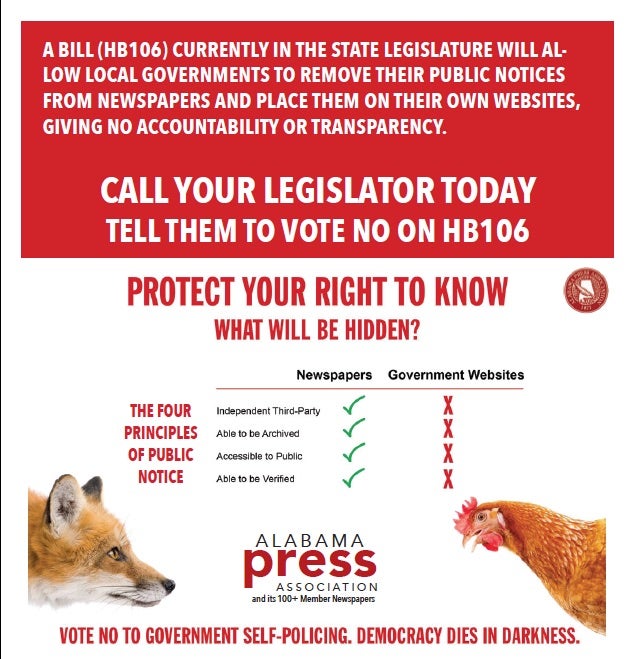Editorial: Let’s not put the foxes in charge of the henhouse
Published 3:46 pm Friday, April 21, 2023
|
Getting your Trinity Audio player ready...
|
From the Alabama Press Association
Politicians in Montgomery are considering legislation that would allow local governments to post legally mandated public notices on their own websites instead of publishing them in local newspapers.
It’s a dangerous proposal that would sabotage transparency by authorizing the government to take over a function now contracted out to private businesses.
House Bill 106 is the perfect example of allowing the fox to guard the henhouse.
Along with open meetings and freedom of information statutes, public notice laws are an important part of the three-legged stool of government transparency. They require government officials to publish factual information about their plans and actions — meetings, budget and zoning proposals, school district reports, etc. — in local newspapers. This ensures citizens have access to information they need to participate in the governance of their communities.
Publishing public notices in newspapers is still the law in all 50 states and is an essential element of our democracy.
In addition to being in print, most newspapers in the state already publish their notices on their websites, and on alabamapublicnotices.com, the statewide public notice site. And newspaper websites attract far more traffic than the government websites that serve their communities.
Of course, it makes sense that newspapers and their websites have more readers than government websites. Newspapers draw readers to their products with news, entertainment, sports and more, both in print and online. It is their core mission.
Allowing local governments to eliminate printed notices is a bad idea for other reasons as well.
Information on the web tends to get lost and is easily hidden. The massive migration from desktop computers to small-screen mobile devices magnifies this dilemma.
The internet has other vulnerabilities that make it a poor choice as an exclusive venue for public notices. Newspaper notices can’t be changed once they’re published, whereas digital notices are fraught with the potential for modification.
Websites can and do get hacked and altered. Government sites are especially vulnerable. They can be taken off-line through normal service disruptions, extended power outages, denial-of-service attacks, or ransomware demands.
Public notices on websites can even be fabricated to cover up the fact they were never published. That’s why courts make it more difficult to introduce digital evidence.
The uncertainty of digital information raises another vital issue exposing the dangers of HB106. Do we really want to put the government fox in charge of the informational henhouse?
Requiring independent, third-party newspapers with a financial and civic interest in ensuring public notices run in accordance with the law was our legislative ancestors’ way of providing verification.
Giving government officials the means to hide public notice information that does not suit their interests is not a good idea. It does not mean they are bad people, it’s simply human nature to seek to shape our own narratives.
The truth is there are too many ways for public officials to hide information on websites under their exclusive control. Removing newspapers from the public notice process would eliminate an important check on that tendency, and exponentially increase the risk that vital civic matters will be kept from the public.
Swapping newspapers and newspaper websites for exclusive notice via government websites is a bad trade that will leave more people less informed.
Call your local House members and ask them to vote “NO” on HB106.
Information about which state elected officials serve your district is available at sos.alabama.gov/alabama-votes/elected-official-map




